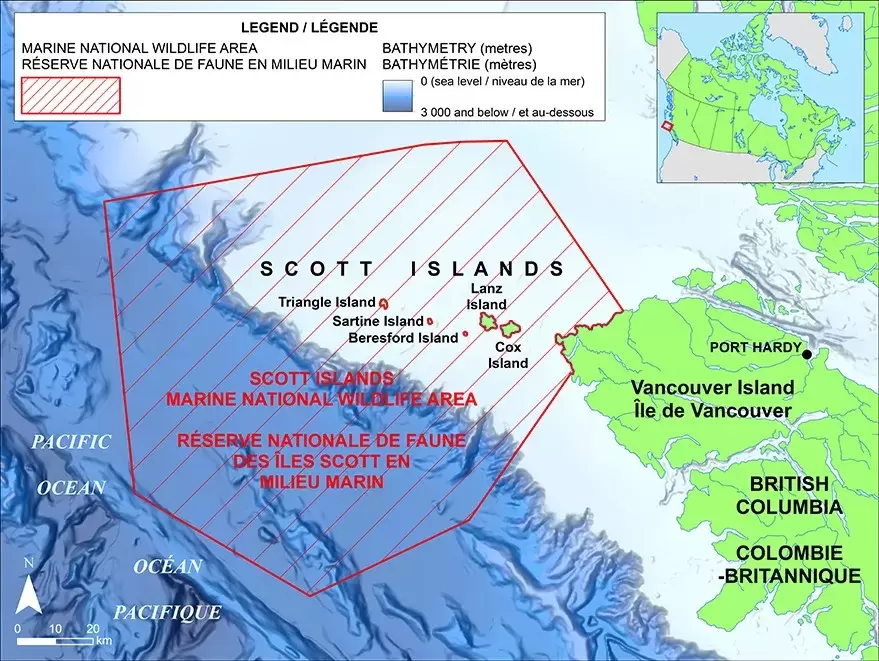Shell Canada has committed to surrendering offshore exploration rights over vast swaths of coastal sea floor encompassing an area greater than Vancouver Island.
A Canadian affiliate of energy giant Dutch Shell, the company announced Sept. 13 that it is relinquishing 50,000 square kilomtres of drilling permits that extend along much of the B.C. coastline, including the west coast of Vancouver Island.
“Releasing these exploration permits can help protect spectacular and environmentally rich areas off Canada’s West Coast where we have no plans to explore for oil and gas,” said Michael Crothers, Shell Canada president and country chair. “We saw an opportunity to support marine protection as part of our ongoing efforts to find pragmatic ways to contribute to conservation in Canada while maintaining our robust global exploration portfolio.”
While massive in terms of permit area, Shell’s announcement drew only passing mention in mainstream media, possibly owing to the fact that a federal drilling moratorium has blocked subsea oil and gas exploration along the West Coast since 1972.
Some of the permits Shell gave up lie within the sedimentary Tofino Basin in Nuu-chah-nulth territory.
“My understanding is that it coincides with the marine protected area announced by the federal government,” said Andy Callicum, Nuu-chah-nulth Tribal Council vice-president.
On June 27, the Canadian government established the Scott Islands marine national wildlife area (NWA) off the Island’s northwest coast. Shell’s relinquished permits include about a third of the NWA.
Crothers said the company is not looking for compensation for its release of the holdings and pointed to Shell’s 30-year track record of other voluntary conservation, including release of exploration rights off Nunavut two years ago.
In a news release, Shell said it plans to formally release the permits and work with the Government of Canada “on potential investments to support marine conservation efforts in consultation with Indigenous Peoples and environmental groups.” The company said it will also seek advice from the Nature Conservancy of Canada to determine how its initiative might achieve the most effective conservation outcomes.
While not unwelcome, the company’s announcement was by some accounts unexpected.
“In my opinion, it’s good to see, but I can’t help but wonder what they’re asking for in return,” Callicum said. “As a corporation, you don’t give up something like that for nothing.”
Shell’s vast holdings date back to the 1960s and the postwar energy boom. B.C.’s Social Credit government declared a Crown reserve over oil and gas resources and began selling exploration permits. Between 1967 and 1969, Shell drilled 14 deep holes in Barkley Sound and along the coast.
By then oil tanker and rig disasters were causing environmental damage on coastlines around the world, elevating concerns about risks to marine ecosystems along the B.C. coast from continued exploration and increased tanker traffic.
Some gas shows were found off Tofino before the Canadian government halted activity in 1970, followed by the 1972 moratorium and a saga of reviews and jurisdictional feuding between federal and provincial governments down through the years.
Anxious for royalties, the B.C. Liberal government recommended lifting the moratorium in 2001 and formally requested its removal in 2007. More recently, Christy Clark as premier backed away from that request.
The latest federal designation off Cape Scott protects 11,546 square kilometres of marine habitat considered among the most biologically diverse on the West Coast. Especially important to migratory seabirds, the area surrounds five islands already protected by the provincial government.
Any activity that disturbs or threatens wildlife and habitat is prohibited within the marine NWA with the notable exceptions of fishing and navigation.
The federal government intends to cooperatively manage the area with the province, Quatsino and Tlatlasikwala First Nations and stakeholders, including industry and environmental organizations.
“Effective protection of our coasts, oceans, and wildlife requires strong partnerships and collaborative efforts on all sides,” said Jonathan Wilkinson, Fisheries and Oceans minister, who joined Crothers for the announcement in Vancouver.
The North Van MP said they are working with First Nations partners, the B.C. government and Shell to ensure the Scott Islands remain “a thriving hub of biodiversity and marine life for generations to come.”
Wilkinson said the federal government will provide $3.2 million over five years in funding for management of the NWA. He also said DFO would consult with fish harvesters about regulations to prohibit bottom trawling for groundfish in portions of the NWA.







